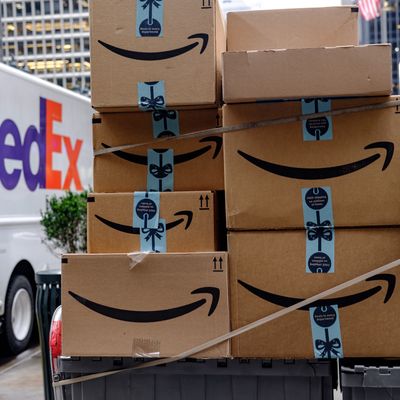
Sometimes I play a fun game in my head and try to figure out which large technology company I’m most scared of. Some days I go with Google, which hosts all of my emails, knows everywhere I go, and makes the software — Google Docs — with which I’m composing this article right now. But most days it’s Amazon.
Amazon not only has a very firm grasp on nearly all of my consumer spending outside of groceries, but thanks to Amazon Web Services, it’s the backbone of most of the internet (including the website you’re reading this on right now). But it’s the company’s voraciousness — its insatiable hunger to expand into new areas — that makes the company so frightening. Apple, Microsoft, Facebook, and even Google seem largely content with being technology companies. Amazon wants, to crib from the title of Brad Stone’s seminal book, The Everything Store, to be an everything company. (I express how scared I am of Amazon while also, of course, being in the sixth year of my Prime membership and planning to go to bed tonight by reading a book on my Amazon Kindle.)
Still, my fears about Amazon put me very much in the minority. Per Georgetown’s 2018 American Institutional Confidence Poll, Amazon is the second-most trusted institution in America, behind only the U.S. military. It’s also the most well-liked and trusted of the “big five” tech companies; a survey conducted by Reticle Research and the Verge found that, compared to Apple, Facebook, Google, Microsoft, and Twitter, Amazon is by far the most well-liked tech company, the one most trusted to keep users’ information safe, and the company users were most likely to recommend to their friends and family.
A new poll of 1,013 Amazon shoppers from Investing.com shows how far that trust goes. Of the shoppers surveyed, 43 percent had stopped shopping at malls, and nearly half said they shopped for books exclusively through the retail site. Another 48 percent said they shopped for consumer electronics solely on Amazon.
But what caught my eye was that a significant number of Amazon customers not only said that they would buy products exclusively through the service, but that they would exclusively buy products made by Amazon, whether by AmazonBasics or by any of the 20 and growing number of private labels Amazon owns. Nearly three out of four Amazon shoppers said they would buy an Amazon–branded computer, and half said they would use Amazon for GroupOn–esque local coupons and deals. Perhaps more surprising were the other offerings: 15 percent of shoppers would buy health care coverage through Amazon, 13.5 percent would buy Amazon–brand medical marijuana, 13 percent would buy cryptocurrency through Amazon, and 9 percent would buy prescription drugs with the smiling Amazon logo on the bottle.
Reading through the survey results, I was initially surprised at things like the nontrivial number of people who would buy some form of Amazon health insurance. Then I thought about my own health care company’s website and customer service, a confusing mishmash of 404s, circular loops, and long hours on hold with customer service people trying to make sure all of my family’s medical bills were covered.
And then I thought about how quickly Amazon is able to get everything from TVs to diapers to my doorstep, and how easy it was to work with customer service should a package go missing or get delayed. With that slowly dawning horror that comes when one realizes the call is coming from inside the house, I discovered that if America is forced to continue to use private insurance, I very well might sign up for Amazon health care if the company should ever choose to offer it. I’d still be terrified of the company, but apparently fear doesn’t really affect my buying habits.






























